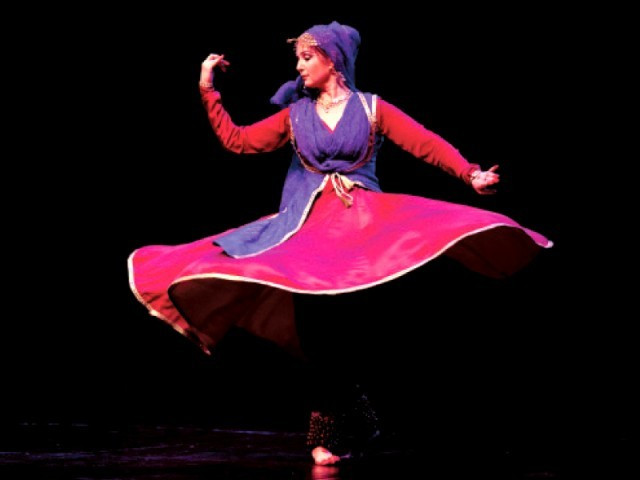Shall we dance together?
Music is no longer just the sound blasting out of the system in the corner, it is now the pounding beneath her feet.

Music is no longer just the sound blasting out of the system in the corner, it is now the pounding beneath her feet. PHOTO: MYRA IQBAL/EXPRESS
As the music stops, it takes you a second to realize that this is not a scene from a high budget Hollywood movie or an MTV video. What you’ve just witnessed is a couples’ dance class, one of many that are now being offered in cities across Pakistan, and you suddenly realize this could be you. The two central figures, so glamorous and fit, could be you and your partner.
Bodybeat Recreational Studio, one of the pioneers of the couples’ dance trend in the country, sits atop the Bundu Khan restaurant on Karachi’s Badar commercial street — an ironic location for a place all about fitness. It is the brainchild of Hasan Rizvi, a trained dancer and highly talented instructor. Apart from the namesake Bodybeat class taught by Hasan himself, which is a unique combination of hip-hop, Bollywood and bhangra, the studio offers zumba, dance kinect (for kids), break dance, fat torching plan, boot camp, aerobics, yoga, belly dance, and taekwondo. Currently, around thirty-five couples come in to work out together, with four couples in Hasan’s class alone.
Interestingly, the ‘couples welcome’ trend that is now catching on like wildfire initially started as a process to make sure that the gentlemen who were coming in to dance were doing so out of genuine passion for dancing, and not to ogle at females in the class.
“Because we live in the society we live in, there was no way for me to vet the gentlemen that came in unless they were with a wife, girlfriend, fiancée or friend,” says Hasan.
Now, however, this very environment has become the deciding factor for many to enroll.
“This option [to join together] made it that much easier to consider. Dancing with a partner is the most liberating feeling, especially in a country like Pakistan,” says a participant who, along with his wife, took the Bodybeat class at the time of its inception some five years ago.
Hasan’s Bodybeat session can be summed up in two words: high impact. Observing a class is, in actuality, like watching choreographed pieces from the Step Up movie series, albeit with a desi twist. The moves are fast and intense, and each step is aimed at fitness. Hasan is a benevolent drill sergeant, pushing people to their limits, egging them on to do better and better. He is wildly energetic, and demonstrates each move with impressive technical clarity. There is a respectful rapport between the instructor and the participants and between the classmates themselves. Towards the end of the class, the scent of hard-earned perspiration fills the air. The couples, and other participants, are drenched and satisfied.
In the last five years, over 2,500 people have taken the class, many with their partners. “I’ve explored the whole of Pakistan through this platform,” Hasan says. “Where else would I be able to meet all these different people?”
And different is right. A striking feature of the class is its diversity. There are men and women, boys and girls, bankers and students alike. On the dance floor, relationships are rekindled, friendships are strengthened, and new sparks are ignited. The positivity that emanates from the group as a session concludes illustrates what a great stress reliever dance is.
Husna Azad, the marketing manager at Bodybeat, says couples’ dance was bound to catch on in Pakistan, especially because of the dearth of activities for those in a relationship. “None of our activities are actually active! They all revolve around food. Even going to the movies is a fairly recent development,” she says.
The fitness aspect, coupled with the romantic dimension, makes this concept an easy sell. “It’s great for married people, and even people who are dating or engaged. Where else do you go, what else do you do together? This is such a constructive way to get to know each other… and at the end, you get a good work out,” she says.
“Dance classes are such a welcome change. They’re exciting and fun and great for staying fit. Definitely very romantic,” says a participant who took a dance class with her husband a couple of years ago.
Luckily, it seems that in the half a decade that Bodybeat has been operational, society has inched forward. While acceptance for dance classes was present from the very beginning, dance itself was a taboo. This perception, says Hasan, is finally evolving. Mindsets are finally changing.
“As I’ve become more popular, my fan base has increased. So it would be stupid for me to say, just based on the waitlists for my class, that dance is more acceptable now. But let’s talk statistics. We [Bodybeat ensemble] performed at the Hum telefilm awards four years ago and received around 50,000 hits on YouTube in total. This year, we performed at the Bridal Couture Week in Lahore and received 50,000 hits on the first day. That’s a good way to weigh something out,” he says. “Now, people share dance. They want to see dance in fashion, in corporate shows, in activations. It’s a craze.”
Good for reasserting individuality and for reinforcing relationships? What a craze indeed.
Published in The Express Tribune, Sunday Magazine, December 30th, 2012.
Like Express Tribune Magazine on Facebook to stay informed and join the conversation.



















COMMENTS
Comments are moderated and generally will be posted if they are on-topic and not abusive.
For more information, please see our Comments FAQ